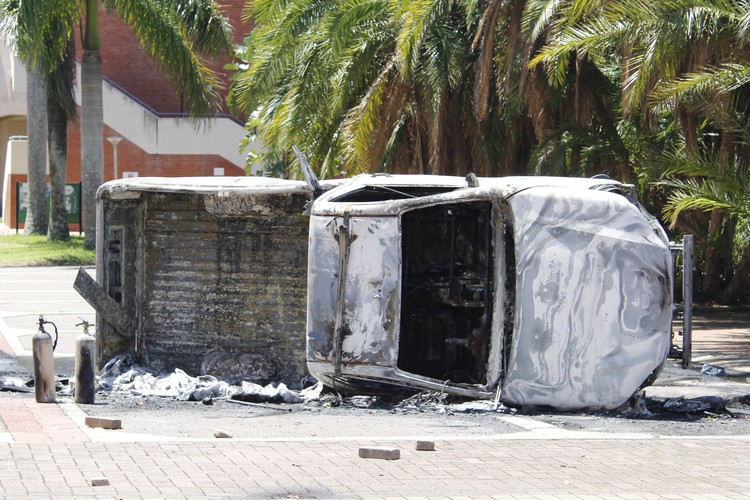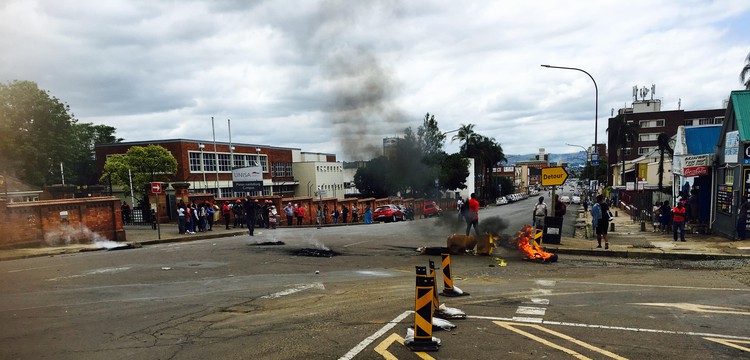Students shut down KZN campuses because of funding delays
“We were promised free education yet we are still asked to pay.”
Students protested in Durban and Pietermaritzburg on Monday against payment delays by the National Student Financial Aid Scheme (NSFAS). Students say this has left them unable to pay fees and unable to register. Many are without accommodation.
Classes were suspended at several universities including the University of KwaZulu-Natal (UKZN), Durban University of Technology (DUT), Mangosuthu University of Technology (MUT) and the University of Zululand (UniZulu). Protests also took place at UNISA’s campus in Pietermaritzburg.
Early on Monday protesters torched a car and stoned cafeteria windows as well as the main hall at UKZN’s Westville campus. By the afternoon there was a heavy police and campus security presence at MUT and UKZN (Westville and Howard campuses).
SRC member Wiseman Mdakane said that negotiations with the university’s management had been futile and the shutdown would continue until all students were able to register and be accommodated.
“We demand the institutions – MUT, DUT and UKZN – allow students who cannot afford to register the opportunity to do so. We also want the university here in Westville to build at least five more residences on campus to help accommodate the students, new and returning, who are currently homeless,” said Mdakane.
A second-year student from eShowe, Nomkhosi Ndlovu, said, “My aunt lives in a shack nearby with her five children, eMhlabeni, and is currently offering me a place to stay while I register to study for Electrical Engineering … I have no funding for accommodation or to study. We were promised free education yet we are still asked to pay.”
Four UNISA students at the Pietermaritzburg campus were shot with rubber bullets during a campus shutdown protest lead by the South African Students Congress (SASCO). Police also used teargas to disperse protesters.
Students blocked Langalibalele Street with burning tyres.
“I was not even protesting but they decided to shoot me,” said Nomzamo Mhlongo, a third year student from Msinga who was hit on her right leg. Mhlongo said she was getting out of a taxi when security guards shot her.
“I knew there was a protest and I was not part of it. I had come to the campus to register. I saw students running and they were being shot at. Students are aware that there is a protest but not all of us are protesting. I did not run when they shot me. The only option was for me to stand on the side of the road and watch. They continued shooting until the crowd had dispersed,” said Mhlongo.
UNISA SRC member Sphe Ndaba said that the SRC had a list of 600 students in a predicament over funding. Registration had been extended from 25 January to 31 January, but students had still not received their funds.
Police Colonel Thembeka Mbele said about 50 students protested. “They blockaded the road with burning tyres,” she said. But she said there was no damage and no cases have been opened.
DUT spokesperson Noxolo Memela said a management meeting on Monday afternoon would address the day’s events. The institution will comment then.
NSFAS is also still working on a response to media requests for comment.
Students blocked Langalibalele Street with burning tyres. Photo: Nompendulo Ngubane
Support independent journalism
Donate using Payfast

Don't miss out on the latest news
We respect your privacy, and promise we won't spam you.
Letters
Dear Editor
Fee-free tertiary education is not "free"; it is payed for by government, which in turn, collects the money from taxpayers and other contributors to the fiscus.
How fair, and how sustainable, fee-free education is in a middle-income economy that is struggling mightily, has been the subject of many thoughtful articles. But, have it we do, and it cannot be undone.
The fact that only GroundUp covered this story is interesting, though. Is it because KZN campuses are simply not in the same academic league as, say UCT or Wits, or is it because KZN students are mainly Black or Indian, whereas UCT and Wits remain significantly White? Who knows, but to be at all surprised at this latest unrest indicates astonishing naivete, an unwillingness to accept the reality that SA is NOT a wealthy, sophisticated and superbly managed (in terms of the civil service) country, and ignorance of the fact that introducing fee-free education would inevitably result in chaos.
My heart goes out to the many thousands of students whose dreams will not be realized anytime soon, and a pox on those those who recklessly advanced the notion of fee-free education in South Africa's current logistical, financial and political reality.
© 2019 GroundUp.
This article is licensed under a Creative Commons Attribution-NoDerivatives 4.0 International License.
You may republish this article, so long as you credit the authors and GroundUp, and do not change the text. Please include a link back to the original article.


